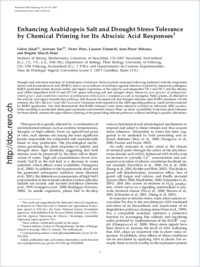Enhancing Arabidopsis salt and drought stress tolerance by chemical priming for its abscisic acid responses
- Jakab, Gabor Department of Biology, Plant Biology, University of Fribourg, Switzerland - Institute of Botany, Biochemistry, University of Neuchâtel, Switzerland
- Ton, Jurriaan Institute of Botany, Biochemistry, University of Neuchâtel, Switzerland - Section of Phytopathology, Faculty of Biology, Utrecht University, The Netherlands
- Flors, Victor Institute of Botany, Biochemistry, University of Neuchâtel, Switzerland - Departamento de Ciencias Experimentales, Área de Fisiología Vegetal, Universitat Jaume, Castellon, Spain
- Zimmerli, Laurent Institute of Botany, Biochemistry, University of Neuchâtel, Switzerland
- Métraux, Jean-Pierre Department of Biology, Plant Biology, University of Fribourg, Switzerland
- Mauch-Mani, Brigitte Institute of Botany, Biochemistry, University of Neuchâtel, Switzerland
-
2005
Published in:
- Plant Physiology. - 2005, vol. 139, no. 1, p. 267-274
English
Drought and salt stress tolerance of Arabidopsis (Arabidopsis thaliana) plants increased following treatment with the nonprotein amino acid β-aminobutyric acid (BABA), known as an inducer of resistance against infection of plants by numerous pathogens. BABA-pretreated plants showed earlier and higher expression of the salicylic acid-dependent PR-1 and PR-5 and the abscisic acid (ABA)-dependent RAB-18 and RD-29A genes following salt and drought stress. However, non-expressor of pathogenesis-related genes 1 and constitutive expressor of pathogenesis-related genes 1 mutants as well as transgenic NahG plants, all affected in the salicylic acid signal transduction pathway, still showed increased salt and drought tolerance after BABA treatment. On the contrary, the ABA deficient 1 and ABA insensitive 4 mutants, both impaired in the ABA-signaling pathway, could not be protected by BABA application. Our data demonstrate that BABA-induced water stress tolerance is based on enhanced ABA accumulation resulting in accelerated stress gene expression and stomatal closure. Here, we show a possibility to increase plant tolerance for these abiotic stresses through effective priming of the preexisting defense pathways without resorting to genetic alterations.
- Faculty
- Faculté des sciences et de médecine
- Department
- Département de Biologie
- Language
-
- English
- Classification
- Biological sciences
- License
-
License undefined
- Identifiers
-
- RERO DOC 5483
- DOI 10.1104/pp.105.065698
- Persistent URL
- https://folia.unifr.ch/unifr/documents/300075
Statistics
Document views: 193
File downloads:
- Texte intégral: 268
